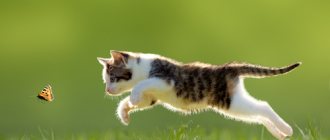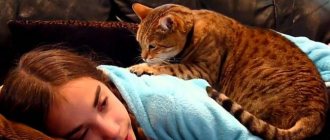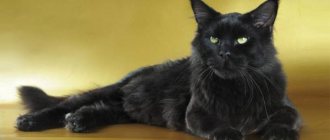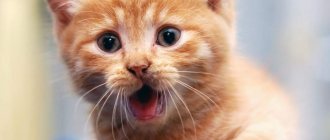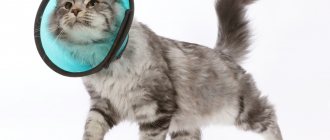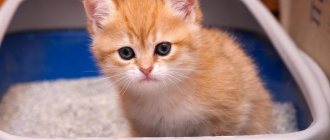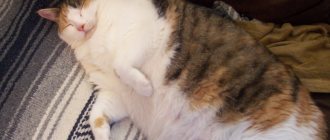Home » Interesting collections about cats and dogs
The best rest after a hard day of work is at home, in a chair, listening to the purring of a cat and inhaling the aroma of freshly brewed tea, plunging into the world of magical pages of fascinating stories. And owners of furry friends can combine business with pleasure - read a book about tailed friends in the company of their pet. Here are some fascinating works, the main characters of which are cats.
- 2 "Simon's Cat on His Own" Simon Tofield
- 3 "The Diary of a Killer Cat" by Anne Fine
- 4 "The Unadorned Cat" by Terry Pratchett
- 5 “Cats in the House” and “Cat Troubles” by Doreen Tovey
- 6 “An extraordinary cat and his ordinary owner. Love Story" Peter Geeters
“Notes of the Cat Shashlik” Alex Axler
The story, told in the first person in the genre of humorous prose, is about a kitten bought at the market by a woman as a gift for her husband. The animal gets an unusual name - Shashlik. He grows up, gains experience and gets into various funny troubles. And all this is decorated with subtle and pleasant humor.
The author of the work is Alex Axler, satirist, blogger and writer. In addition, he is very well versed in cat psychology. The book explains many of the habits of tailed animals that are familiar to owners of four-legged friends. The work will answer many questions that cat owners have been asking themselves for centuries. It will also help you understand and accept the character of those who purr.
"The Diary of a Killer Cat" by Anne Fine
Another book written from the perspective of a cat named Taffy. It consists of several funny stories, with a touch of black humor, from the life of a cat who loves to bring his “trophies” in the form of animals he has caught to his owners. In addition, Taffy is an extremely amorous and friendly cat. In short, the stories are different and extremely exciting.
Anne Fine, the author of The Diary, is a winner of the Best Children's Writer Award, a Fellow of the Royal Society of Literature, and an MBE, which definitely inspires respect. And “The Diary of a Killer Cat,” although intended for middle school children, will also appeal to adult readers.
“Big Book” laureate Gregory Sluzhitel talks about his novel “Days of Savely”
The winner of the “Big Book” award was actor Grigory Sluchitel for his debut novel “Days of Savely”. The novel is written from the perspective (more precisely, the face) of a Moscow cat, but everyone understands that it is about us, people, and about the era of the 2000–2010s. Ogonyok spoke with the author.
Interviewed by Andrey Arkhangelsky
If the actor of the Moscow Theater Art Studio, Grigory Sluzhitel, had seriously taken up writing a “novel about the collapse of the old world,” we would have had another example of nostalgia, reflection, and everything that has been customary to do in Russian literature over the past two centuries. However, the aspiring writer did not create either satire or grotesque; he used the classic technique of detachment, and we saw our reality from the outside - through the eyes of a creature that was as disinterested as possible, and therefore objective - the city cat Savely. In addition, the Servant does not flirt with the reader. He directly writes that death is inevitable, and happiness is fleeting. Finally, the novel has a lot of sympathy for “non-famous” people - those who lost themselves in an era of change and despaired of finding themselves. An unexpected feeling for a “kitten novel” of abandonment, melancholy, decay; however, this also creates a feeling of novelistic truth.
— The life of your cat Savely, of course, is full of dangers, but you can’t help but think that in some ways it’s easier for him than for us humans: for example, with housing. In the center of Moscow, a banana box or an abandoned house is enough for him...
- Yes, my cat is lucky, and he understands that his life could have turned out completely differently. His relatives manage to live in urban conditions for only one or two winters, and on his way all the time he came across people who helped, picked him up, fed him... And at times he had a house, not the worst conditions, but in general he was... metaphysically homeless. If he had simply looked for his corner, he would have stayed with his first owners for the rest of his life. But he, on the contrary, constantly runs away. He is restless, he feels that he does not have his own square on this chessboard. Basically, this is a book about renegades, about outcasts.
— We can assume, in view of the atypical nature of your cat, that, for example, the soul of another creature could have moved into him, so his manner of telling the story is reminiscent of a human one. We easily accept this convention. But you don’t explain anywhere: where did your cat get such a good education? Maybe he read a lot of books while living with his owners?
- In fact, the cat is not very educated. He knows Latin to a C level, for example. He rather thinks that he is educated. At first I had the idea of devoting an entire chapter to the history of his education. But I quickly abandoned this idea.
The technique of a cat thinking like an adult is an absolute convention. Either the reader immediately accepts it or he doesn’t. In the same way, the reader must accept or not accept another convention - that this is, in general, a posthumous biography, which the hero tells as if after death.
Or, for example, he describes his first weeks of infancy in what is called a high style, but he remembers this already as an adult. In general, the most difficult thing was to invent my own code of laws, I struggled with this...
- Excuse me, were you toiling over the book? The feeling is that the novel was written quickly and easily.
“I’m glad to hear that, but it couldn’t have been easy.” Of course, some things were easier, some were harder. But I generally don’t trust those who say that writing is easy. The most difficult thing, as I already said, is to come up with the rules of the game for the reader, so that he accepts them. Or, to put it another way, find the right intonation. When I met Evgeniy Vodolazkin, who was one of the first to appreciate my book and helped me a lot, he told me that he had been looking for the intonation for his “Laurel” for several months. I also spent a long time looking for the exact tone. The proportion of absurdity and reality. For example, the cat quotes Aristotle, Chekhov, refers to the paintings of Antoine Watteau, but does not know what kind of person wishes Russians a Happy New Year every year. And for this I was also reproached: that, they say, the cat is somehow one-sidedly educated. However, such one-sidedness was dictated precisely by the tone of the narrative I had chosen, which did not allow me to completely immerse myself in reality.
“Not only is your cat educated, but he also expresses himself in an emphatically academic, florid manner... Accepting your rules of the game, one could say that this is how library cats spoke in the 1970s or 1980s...
“What can I do, I’m infected with normal classicism... Maybe this is how mine—and my cat’s—is manifested!” - longing for order. Of course, this refers to the longing for internal, spiritual order. I didn't intend to make highly social prose. But sociality invades the novel, against my will. And in the end it turns out to be a thing about the destruction of the usual way of life and the melancholy in connection with this. And the attraction to classicism is probably an attempt to somehow protect against destruction. Indeed, by the end of the book, not only the life of my hero begins to collapse, but also the city itself. The cat also has a longing for orderliness, which has never existed in his life, except for his infancy. But he is constantly haunted by the feeling of a lost paradise. And this probably gives rise to some of the baroqueness of the novel. It was actually very important for me to choose some kind of musical counterpoint for the book.
How did the Big Book 2019 award ceremony take place?
I chose the allegro from Vivaldi's L'Amoroso from the very beginning. Then he decided to change everything, and instead of Vivaldi he took Bach’s Prelude in E minor. There is a famous interpretation of this prelude performed by Glenn Gould - he plays at a much faster tempo than usual, which is why this piece resembles a cat step in tempo. Not very rushed, but not very slow either. But in the end, he still rejected this option; Bach sounded too alarming, but I needed some kind of Italian vitality, an unconditional joy for life, for my mood. In the end, I still left Vivaldi, and my cat hears it constantly, from every iron. This is his idea of paradise lost.
— As you write, it is not customary to ask cats about their fathers; but I’ll still ask you about your hero’s literary parents. Many people have already been mentioned. Also, for example, there is Vysotsky’s “Parrot’s Song,” from the album “Alice in Wonderland,” where the refrain is: “And I was already real!” Your cat also recognized himself early as a person, felt real...
- I heard this song, of course, in childhood... You know, in the novel there are even specific references to those authors who inspired me - to Proust, for example, whom I love and am not ashamed to admit it. His mood is very close to me. There are also echoes of Sasha Sokolov, “School for Fools.” If we talk about some global ancestors, then I was guided by the mood of Beckett’s heroes, who are wandering from somewhere unknown. Their feeling of constraint, constriction, human despair... And, of course, I was guided by Chekhov’s intonation.
— After the cat’s ordeal around Moscow, which you described quite convincingly, a natural question is: was your childhood happy? This is the 1990s era, right?
- Quite happy. You know, in this novel there were many strange, unconscious intersections with my childhood, but I only realized this later. My cat was born in Taganka, where my mother and grandmother lived. And my theater (Theatrical Art Studio.— “O”
) is located in the same area. Describing the Clara Zetkin maternity hospital, I did not know that I myself was born there. Having already written the book, I asked my mother - and it turned out that I was born in Shelaputinsky Lane, in the same place as my cat. And there were many such coincidences. True, I cannot say that I treat Kuzminki with the same trepidation, where I spent my childhood, in those very 1990s. But thanks to this experience, I know what it’s like to grow up on the outskirts of the capital, where a third of your class later drank themselves to death. At the same time, I’m not a fan of criticizing the 1990s. Those whose youth occurred during these years, as a rule, remember them with love. If we make any social diagnoses, it seems to me that in general this was an era of unfulfilled hopes. Despite all the sympathy for the prospects that were opening up, in general, nothing came true... Unfortunately. Of course, I communicate with those who are older, and the opinions about that time are diametrically opposed. I remember, for example, what it was like for my mother then - she graduated from the Maurice Thorez Institute, French department. And for her, as a humanitarian, all the changes were a disaster. But at the same time, I know people who still found themselves and were able to ride this wave.
— One of the most powerful moments of your book is that an elderly teacher passes the time by re-checking the notebooks of her former students, finding more and more mistakes in them... This is a very accurate diagnosis of the times. You describe people who seem to be forgotten at a life stop.
“In no case did I want to condemn anyone or, on the contrary, justify them. Just from the intonation, the tone, it seemed important to me that this feeling should be present in the book. Why did I say “Chekhov’s intonation”? Well, it would seem, what could a cat have in common with Chekhov? Nothing, perhaps. Except for one thing - a view of the world, as I already said. Remember, Nikolai Glazkov: “I look at the world from under the table.” In fact, this is exactly Chekhov’s view of the world, “at the horizon level.” Not higher, but not lower either. It requires a certain amount of effort and even courage from the Russian writer. A sober outlook, devoid of any idealism. In fact, a Russian writer cannot help but be an idealist. Since Russian people trust the written word more than the spoken word, any writer here quickly tries on the mask of a prophet. Chekhov is unique in this sense. Precisely because he does not try on this mask, nor the robe, nor the cassock. Tolstoy or Dostoevsky have a sea of followers, one way or another; but successors to Chekhov’s tradition are more likely to be found in the West than here. Of the successors of Chekhov the playwright, I can to some extent only name Vampilov.
- Explain one thing to me. Toward the middle of the novel, a cat commune is formed, in which the cats decide to finally establish a “fair life.” And they choose a form of government - between authoritarianism and democracy. But in the end it remains unclear what form they chose. You pose the most important question and do not provide an answer.
— In the cat commune, as you remember, recently a certain consul was in charge. But the career of this villain was cut short by a random grandmother, who took him from the orphanage, put him in her plaid trolley bag and took him away with her. This is how any management in a cat commune ends. Instant and illogical. And I didn’t want to draw any conclusions again. Personally, for what it’s worth, the democratic method of governance is much closer to me, but in the space of the book I did not want to impose my views. This was generally a very difficult chapter for me, and in the end I left it the way it went. I also wanted to leave a touch of absurdity in all this. However, I didn’t want to turn this into social satire - there are many people who do this better than me.
- After all, cats are considered freedom-loving animals; they, as you know, walk on their own...
Cover of the book “Days of Savely” by Gregory the Servant.
Photo: Editorial office of Elena Shubina, 2020
— I am a little familiar with the cat world. Moreover, now that I have written a book about them, I feel that I am, as it were, “responsible for them.” It is clear that cats gravitate towards loneliness. But for the sake of survival, they still prefer to unite in prides. Like any living creature, they have a better chance of surviving in a group than individually. I needed this chapter so that my hero, Savely, would face the eternal questions of existence. He can lead a completely riotous lifestyle in this commune, but still it is not his, as he understands. I just wanted to capture the moment when he separates from cat society. But again, I did not give definitive answers there. You know, we were advised at the theater by a wonderful Czech scholar, Alevtina Pavlovna Kuzicheva, who helped us work on the play. And she perfectly formulated the essence of Chekhov: great uncertainty. I tried to preserve this - not great, of course, but still uncertainty in the novel. Not meaningfulness, but uncertainty.
— In the novel, you also make irony about various social assistance funds, including for animals, which are very popular today. Does this new form of solidarity seem hypocritical to you?
“I categorically support any help of this kind and welcome any means.” But when I'm ironic, this is what I mean. When a person begins to deal with his conscience, why he really helps, for what, he understands: there are some hidden rooms of the soul, overgrown with cobwebs, where it is better not to enter at all.
I make irony about a lot of things in the novel, for example, about the performances at Bolotnaya in 2011. But at the same time, I myself went there and will continue to go. So this is rather self-irony.
- I understand your position. But in almost every answer you give, you sound unwilling to give principled assessments. It seems to me that this position today has led Russian literature to a dead end. At some times she gave “the only correct answers.” But now she refused to give any assessments at all, as if she was afraid to talk about modernity at all. And this no longer looks like objectivity, but like a rejection of life.
— I don’t agree with you - it seems to me that, on the contrary, in recent years new authors have constantly appeared who write quite sharply. But you are right, there are things in our lives that need to be spoken about directly and loudly. When they ask me to record a video in support of those unjustly convicted, I, of course, agree. When I need to sign in defense of Golunov, Serebrennikov, historian Dmitriev, I don’t think twice. But I repeat once again: the main tone of my book is lyrical. Of course, it also contains some things related to our era... You asked about the genre of the book. I thought about it now and would formulate it like this: an existential guide. I wanted, on the one hand, to make a book that relates specifically to our time. But, on the other hand, I hope this book will be interesting to read even after a few years.
At first I actually thought about publishing it on Facebook. I didn’t have any connections in the literary world, I couldn’t even hope that it would be published by Elena Shubina. On the other hand, I understood that the book... worked out. When it came out, I started getting a lot of feedback from readers, which is definitely helpful as an author. Nice. When it was translated, it was very interesting how it was perceived abroad. Because the book contains a lot of specific Moscow realities, which is hardly understandable to foreigners... And the other day a reader from Hungary wrote to me, who calls my cat “native.” Apparently, the story turned out to be universal after all. Although I constantly hear: “There’s so much about cats,” but it’s clear that this is a book not about cats, but about people. I didn’t write some kind of zoological novel: my hero is both a cat and not a cat. Like any hero, he “stands apart from his peers,” as one colleague put it.
— Publishing houses usually advise new authors to shorten their novel to a readable 200–300 pages. Were you advised to change anything in the novel at all? How different is the original version of the novel from what came out in the end?
- It’s no different. When Evgeny Vodolazkin read my manuscript, he promised to send it to Elena Shubina; but warned that, although his assessment matters to the publisher, it will ultimately be up to her to decide. Then I found out that Elena called him at night, having finished reading to the middle, and asked: “Will the cat survive?” Hearing “yes,” she said, “Then we’ll publish it.” Of course, I was afraid that they would ask me to change the tragic ending... If all the cards are revealed, I still changed the ending a little, on Vodolazkin’s advice. Initially, it was, if not open, then, let’s say, ajar. This is a nice thing for the reader, but bordering on bad taste. Because in the situation in which my hero found himself, and the way the plot developed, it was necessary to end exactly the way I ended up. Not flirtatious and not lisping. How can a hero not die, on the one hand? On the other hand, he lived a long and happy cat life, seven years by their standards is a very long time. This is, one might say, an old man. Of course, it was a pity to part with him. But I have to respect the will of my hero, and he always runs away from everyone. So he ran away from me too.
— Except that he didn’t run away from the Tretyakov Gallery on his own, but was kicked out because of intrigues. But the famous cats in the Hermitage, unlike yours, live there from generation to generation, serving art and the fatherland.
“And Savely wouldn’t have stayed long in the museum, I’m almost sure.” No measured life suited him. He... is a constantly running creature. And in fact he doesn’t regret anything.
“It’s stupid to ask you about the next book.” You know how it happens: if you write a sequel about cats, they will call you an opportunist. If you write about something else, they will compare it with the first novel, saying that there was an insight there, but here it’s not the same...
- Well, yes, in general, I understand all this. But just like my hero, I don’t seem to owe anything to anyone, only to myself. Therefore, I try to have the following mindset: as it will be, so it will be. Moreover, my life does not require making an urgent decision. You know, Faulkner, when they told him something about literature, usually answered: I’m actually a farmer. And when they pointed out to him that his corn was not growing well, he replied: guys, I’m a writer. In this sense, I was really lucky: since I am an actor by profession, as they say, try to catch me. As I have heard, my novel is called “an actor's prose.” There is no actor's prose, doctor's prose... There is only writer's prose. Everything else - whatever you do, wherever you work, whatever war you fight in - all this no longer matters.
"The Straight Cat" by Terry Pratchett
Another book about cats in a rather interesting format is an encyclopedia written by a fictional representative of the “Movement for the Protection of Real Cats.” The work in a humorous form will tell about the virtues of outbred, wayward, capricious and disobedient felines.
English writer Terry Pratchett is known as a master of satirical fantasy. He has many works in this genre to his credit. Not long ago, a film adaptation of his collaboration with Neil Gaiman was released. And in the work “The Unadorned Cat,” the author’s love for our purring comrades is subtly conveyed through satire.
"Cats in the House" and "Cat Trouble" by Doreen Tovey
A whole series of books about a Siamese cat named Saji. The first book, “Cats in the House,” tells about an extremely wayward cat who felt like a full-fledged mistress in the house where the couple who sheltered Saji also lived. And in the next book, “Cat Troubles,” the family becomes larger - first, the Siamese kitten Solomon, or simply Sili, appears in the lives of the heroes, who causes a lot of funny troubles, and later the cat Shebalu appears. And then a war breaks out between the little bullies.
The author of the books, Doreen Tovey, knew what she was writing about, because she was the president of the Siamese Cat Club, as well as the West of England Cat Club. And the novels themselves are based on stories from the life of the writer, her husband and pets. The stories are filled with good humor and create a feeling of homely warmth and comfort.
Talking cats: 84 books - download to fb2, txt for android or read online
Prishvin Mikhail Mikhailovich (1873-1954) - Prishvin Mikhail Mikhailovich (1873-1954) is a Russian writer whose philosophical and lyrical prose is associated primarily with themes of nature, folk life and folklore. “The singer of Russian nature,” Prishvin begins as if with a simple study and rises into poetic, spiritual spheres, into the spheres of deep art.
In fact, to evaluate Prishvin as a writer and thinker, the words we find in a letter from Alexei Maksimovich Gorky to Prishvin, written in Sorrento on September 22, 1926, would always and under all circumstances be sufficient. This is what Gorky writes in this letter: “I think that such a lover of nature, such an insightful connoisseur of nature and its purest poet, like you, Mikhail Mikhailovich, has never existed in our literature.
I guessed about this back in the days of “The Black Arab”, “The Land of Unfrightened Birds”, and finally saw the light while reading the absolutely amazing “Springs”. Aksakov wrote “Notes of a Gun Hunter” and “On Angling Fish” superbly, Menzbier wrote wonderful pages in his book about birds, and in Kaigorodov and many others, Russian nature sometimes evoked heartfelt words, but... in none of them did I find everything embracing, piercing and jubilant love for our land, for all its living and supposedly mortal, no one like you, truly “the father and master of all your visions.”
In your feelings and words I hear something ancient, prophetic and paganly beautiful, that is, truly human, coming from the heart of the son of the earth, the great mother revered by you. And when I read your “Phenological” conjectures and reasonings, I smile, laughing with joy, it’s all so amazingly charming from you.
I am not exaggerating that my true feeling of absolutely exceptional beauty, with the power of which your brightest soul illuminates your whole life... Everything about you merges into a single stream of life, everything is comprehended by your intelligent heart, filled with exciting, touching friendship with a person, with you - a poet and a sage.” The disc presents cycles of stories by M.
M. Prishvina: “Forest Master”, “Dogs”, “Beasts”, “Conversation of Birds and Animals”, “Stories of a Hunter”. FOREST OWNER Chanterelle bread “Inventor” Guys and ducklings Duck bathing Hedgehog Golden Meadow Chicken on poles Beetle Queen of Spades Talking rook Khromka Grandfather's felt boots Hawk and lark Forest doctor Vasya Veselkin Forest owner Dead tree Old mushroom DOGS Man's friend It's a pity The first stand A terrible meeting Playing with Romka Hedgehog mittens Romka the vacuum cleaner How Romka crossed the stream Yarik The traitorous sausage Lada Reflection A sip of milk How I taught my dogs to eat peas How a cat and a dog quarreled Warm places Zhulka and the cat Zhulka in the grass Zhulka and the butterfly How Zhulka and I work Dog in human affairs Mink and Zhulka Property in dogs In the rain Dream Zhulki Robik Kado ANIMALS Chipmunk Beast Birth Saucepans Animals Eagle's Nest Blue Arctic foxes Leopard Bear Fighter and Crybaby Hydrochloric acid Mysterious box White necklace CONVERSATION OF BIRDS AND ANIMALS Meadow Conversation of birds and animals Gadgets Twitch and quail Bird cherry Floppers Upstart Birds under the snow Terenty the Cat Eagle owl Floors of the forest What the crayfish whisper about HUNTER'S STORIES Blue bast shoes Cranberry Familiar snipe Goldfinch Hunting dogs Faithful Anchar School in the bushes Smart hare Purple sky Double shot Nightingale topographer Gon How the hare ate his boots Traces of a hawk.
